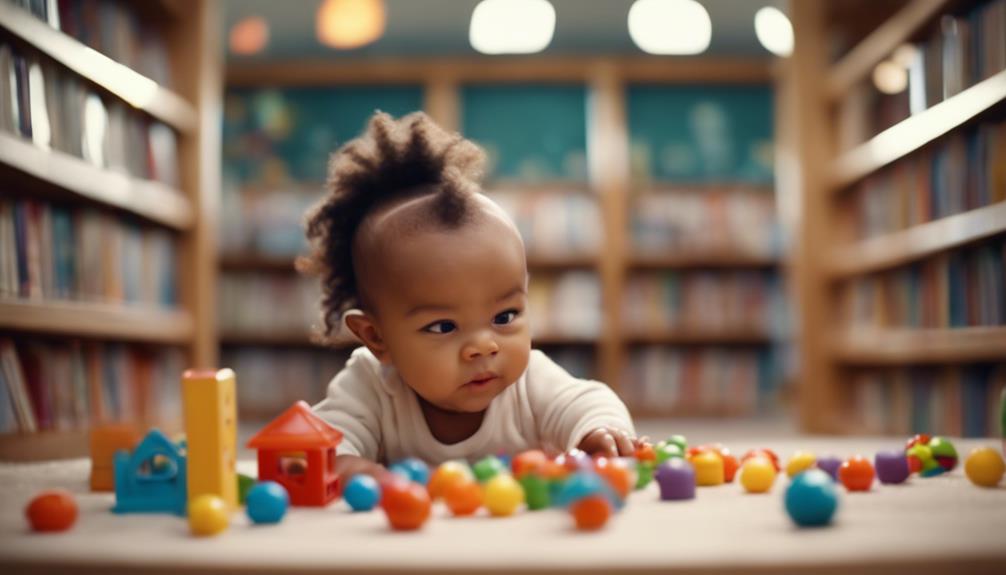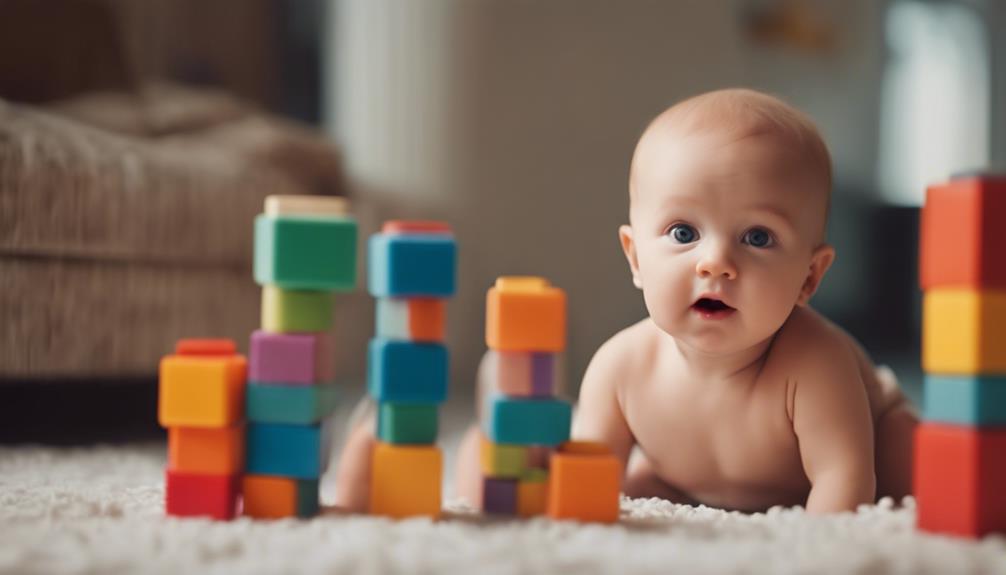At 5 months old, your baby’s intellectual development thrives. They explore senses, recognize faces, and babble to communicate. Social interactions deepen through smiles and voice responses. Object permanence evolves, peek-a-boo becomes interesting. Fine motor skills improve with gentle toys. Problem-solving blossoms as they track and focus on fascinating objects. Memory begins to lay its foundations. Each milestone shapes their growing mind profoundly.
Key Takeaways
- Object permanence understanding develops, crucial for intellectual growth.
- Increased babbling signals early language development progress.
- Social interaction skills improve with smiling at faces and responding to voices.
- Enhanced sensory experiences aid cognitive development.
- Fine motor skills advance through visual tracking and attention.
Sensory Development
By 5 months old, your baby is actively engaging in sensory experiences important for their development. Cognitive development in infants is closely tied to sensory development. At this stage, your baby's sensory abilities play a significant role in their intellectual growth. Infants at 1 month old start to show signs of visual tracking by briefly watching objects and faces. This early focus helps them begin to understand the world around them.
By 2 months, their visual coordination improves as they can follow moving objects with their eyes, enhancing their ability to process visual information. The startle reflex to loud noises, present in babies at 3 months, indicates ongoing auditory development. Sensitivity to sounds and the ability to see objects at a close distance are fundamental for your baby's cognitive and intellectual development.
These sensory experiences form the building blocks for more advanced skills in the future.
Social Interaction Skills

At 5 months old, your baby may start smiling at familiar faces and responding to voices, showing early social interaction skills. Encourage this behavior by engaging in gentle interactions and talking to your little one frequently.
Making eye contact with caregivers is a significant milestone in your baby's social development journey.
Smiling at Faces
Developing social interaction skills, such as smiling at faces, is an important milestone for a 5-month-old baby. At around one month old, infants begin to exhibit this behavior, showing early signs of recognizing and responding to human faces.
The act of smiling at faces is significant as it signifies the baby's growing ability to engage in social communication and interactions. This milestone plays a critical role in fostering positive social connections and bonding with caregivers. It's a clear indicator of the infant's emotional development and responsiveness to external stimuli.
Responding to Voices
Your baby's ability to respond to voices marks a significant step in their social interaction skills development. At one month old, infants start showing interest in sounds and voices by turning their heads towards them. This early response to voices is an indication of cognitive developmental progress and the beginning of social engagement.
Babies may also begin making eye contact and focusing on individuals speaking to them, demonstrating their growing social interaction skills. Encouraging interactions through talking, singing, and maintaining eye contact with your baby can further nurture their social skills. By responding to voices, infants lay the foundation for future communication and relationship-building abilities.
It's essential to engage with your baby through verbal interactions to support their social development and strengthen the bond between you and your little one. Remember, these early responses to voices are key milestones in your baby's growth as they navigate the world around them.
Language Development Progress
At 5 months old, your baby may begin to babble more frequently and experiment with different sounds, signaling early language development.
You might notice your little one recognizing familiar voices and responding with smiles or coos, showing an increased awareness of communication cues.
Encourage this progress by talking to your baby often and responding to their vocalizations, fostering a supportive environment for their language skills to flourish.
Early Babbling Sounds
Exploring language through babbling sounds is a significant milestone in a 5-month-old baby's intellectual development. Babbling marks the beginning of your baby's language development journey, laying the groundwork for future communication skills.
Here are some key points to ponder about early babbling sounds:
- Precursor to Speech: Cooing sounds and gurgles at 2 months pave the way for babbling.
- Repetitive Babbling: Between 4-6 months, babies start babbling repetitive sounds like 'ba-ba' or 'da-da'.
- Speech Foundation: Babbling helps babies practice vocalizations and sound patterns, essential for future speech development.
- Varied Babbling: Around 8-10 months, babies may babble with more diverse sounds and intonations, mimicking spoken language cadence.
Recognizing Familiar Voices
Recognizing familiar voices marks an important step in a baby's language development progress, showcasing early signs of cognitive awareness. At just 1 month old, infants can distinguish the voices of their caregivers, displaying an understanding of auditory stimuli.
It's fascinating to observe how babies react differently to familiar voices, indicating their growing communication skills. This early ability to recognize familiar voices lays the foundation for language comprehension and helps infants bond with those closest to them.
By showing preferences for known sounds, babies demonstrate an initial grasp of the world around them through auditory recognition. This cognitive milestone is vital for newborns as they begin to navigate and engage with their environment.
Encouraging interactions with familiar voices can further enhance a baby's language development, fostering strong communication skills from an early age.
Object Permanence Understanding

Understanding object permanence is an important cognitive milestone for a 5-month-old baby's intellectual development. Here are some key points to keep in mind:
- Object Permanence Definition: Object permanence is the concept that objects continue to exist even when they aren't visible to the baby.
- Cognitive Leap: The realization of object permanence marks a significant step in a baby's intellectual growth, showing an understanding of object constancy.
- Intellectual Development: Achieving object permanence allows babies to start forming mental representations of objects, aiding in memory and problem-solving skills.
- Peek-a-boo Games: Playing peek-a-boo with your baby can be a fun way to reinforce the idea of object permanence. By hiding and revealing objects or faces, babies learn that things return even when out of sight.
As your baby grows and comprehends object permanence, you'll notice increased curiosity and exploration as they begin to anticipate the presence of hidden objects in their surroundings.
Fine Motor Skills Development

Developing fine motor skills is essential for a 1-month-old baby's early growth and coordination. At this age, your baby is starting to show signs of visual tracking and attention by briefly watching objects and faces. You may notice your little one following moving objects with their eyes, displaying the beginnings of hand-eye coordination and fine motor skills development.
Encouraging this visual tracking by using toys and engaging in gentle movements can further support your baby's fine motor skills growth. These early interactions help your baby practice focusing and tracking objects, which are vital skills for future hand-eye coordination.
Additionally, at 1 month old, your baby might startle at loud noises, demonstrating their developing auditory responsiveness and sensory abilities. By nurturing these skills through simple activities, you can contribute to your baby's overall fine motor skills development during this critical early stage of growth.
Cognitive Milestones Achieved

At 1 month old, your baby demonstrates important cognitive development through increased visual attention and responsiveness to auditory stimuli. Here are some cognitive milestones achieved by infants at this stage:
- Visual Attention: Babies can briefly watch objects and faces, showing signs of early visual attention.
- Visual Tracking Skills: They start to follow moving objects with their eyes, indicating developing visual tracking skills.
- Auditory Sensitivity: Babies may startle at loud noises, demonstrating their responsiveness to auditory stimuli.
- Recognition of Familiar Faces: Infants at 1 month old may show signs of recognizing familiar people at a close distance.
During this significant period in an infant's cognitive development, these milestones lay the foundation for further progress in the child's cognitive abilities. Encourage and engage with your baby to support their cognitive growth and exploration of the world around them.
Problem-Solving Abilities

Demonstrating problem-solving abilities, a one-month-old baby shows engagement by briefly watching objects and faces. At this age, infants begin to exhibit cognitive processing skills by tracking moving objects with their eyes. Their problem-solving abilities are further highlighted through startle responses to loud noises, indicating early stages of cognitive development.
One-month-old babies also display problem-solving skills by actively tracking and focusing on objects that capture their interest. By observing and following objects with their eyes, these young infants demonstrate their emerging ability to problem-solve and engage with their surroundings.
This early development of tracking objects and faces is an essential milestone in a baby's intellectual growth, laying the foundation for further cognitive advancements in the months to come. Encouraging and fostering these problem-solving abilities through interaction and stimuli can positively impact a baby's cognitive and intellectual development as they continue to grow and learn.
Memory Development

Memory development in newborns begins with limited capacity but early signs of recognition and sensory awareness. This stage sets the foundation for future cognitive growth and learning.
Here are four key points to understand about memory development in one-month-old babies:
- Limited Memory Capacity: At this age, babies can briefly watch objects and faces, showing signs of memory formation but with a restricted ability to retain information.
- Early Sensory Awareness: Newborns may startle at loud noises, indicating their developing sensory awareness and responsiveness to stimuli in their environment.
- Recognition of Moving Objects: Babies at one month old can track and follow moving objects with their eyes, demonstrating early cognitive abilities related to memory and visual processing.
- Foundation for Cognitive Growth: The initial memory development in newborns paves the way for future intellectual milestones, shaping their ability to learn, recognize patterns, and remember information as they grow.
Frequently Asked Questions
What Can a 1 Month Old Do Intellectually?
At 1 month old, you can briefly watch objects and faces, follow moving things with your eyes, startle at loud noises, and recognize familiar people up close. These are early signs of developing cognitive abilities.
What Are Four Signs of Intellectual Growth in an Infant?
You can observe intellectual growth in infants by noticing their ability to track moving objects, recognize familiar faces, communicate emotions, and display interest in visual stimuli. These signs indicate cognitive progress and early development.
What Are the Intellectual Skills of a Newborn?
You can see objects 8-12 inches away and are sensitive to sounds. You watch objects and faces briefly. You start following moving objects by two months and recognize feeding sources by three months, turning your head to follow movement.
What Is a Cognitive Milestone of a Baby?
When your baby hits cognitive milestones, they show signs of growing intelligence. Recognizing familiar faces or objects, tracking movements with their eyes, and communicating feelings through cries are early indicators of their developing mind.
Conclusion
To sum up, as the saying goes, 'A baby is like a book, each day a new page.'
By the age of 5 months, your little one is reaching important milestones in their intellectual development.
From sensory awareness to problem-solving skills, they're growing and learning at a rapid pace.
Keep nurturing their development and enjoy watching them flourish into a bright and curious individual.
Remember, every moment counts in shaping their future.










